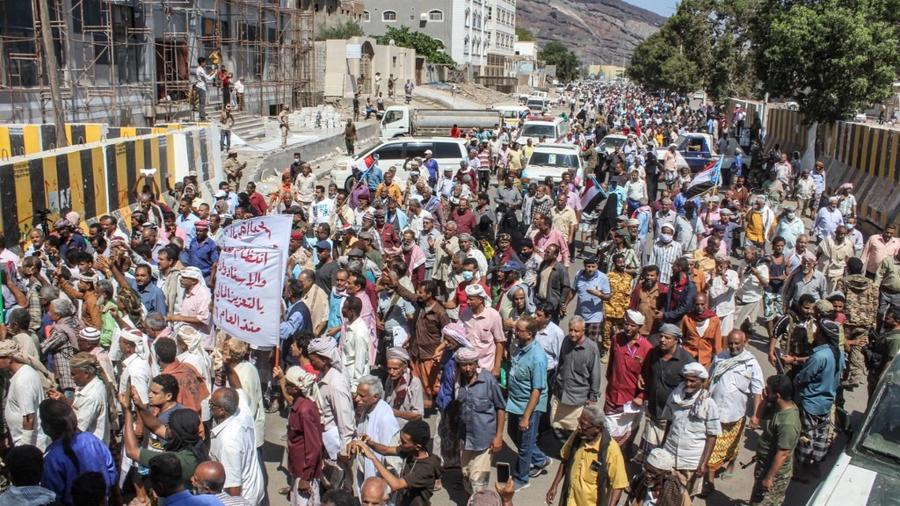Dim prospects for Saudi initiative to end war point to need for detailed plan
 Protesters gather to demonstrate against deteriorating services and economic conditions, outside the internationally-recognised Yemeni government's headquarters at al-Maashiq Palace in the Crater district of the southern port city of Aden on March 16, 2021. (SALEH AL-OBEIDI / AFP)
Protesters gather to demonstrate against deteriorating services and economic conditions, outside the internationally-recognised Yemeni government's headquarters at al-Maashiq Palace in the Crater district of the southern port city of Aden on March 16, 2021. (SALEH AL-OBEIDI / AFP)
War-ravaged Yemen could see the prospects for peace pushed back even further unless a comprehensive agreement that works for all parties is thrashed out, experts said.
On Monday, Saudi Arabia's Foreign Minister Faisal bin Farhan announced an initiative to end the fighting between Houthi rebels and the Riyadh-backed government under the supervision of the United Nations.
Ultimately a ceasefire cannot be realized without integrating all armed groups, nor can it be operational without a detailed plan, where thus far there has been constant quibbling
Clemens Chay, research fellow at the Middle East Institute at the National University of Singapore
The proposal, which involves partially opening the airport in the Yemeni capital Sanaa and reviving a revenue-sharing mechanism between the Houthis and the government, was rejected by the rebels.
Asif Shuja, an Iran expert and senior research fellow at the Middle East Institute at National University of Singapore, said the peace proposal "appears to be a result of the United States' diplomacy", spearheaded by its special envoy Tim Lenderking in consultation with UN Special Envoy Martin Griffiths.
ALSO READ: UN envoy says Yemen ports deal is chance for peace talks
"It is unlikely the Houthis will agree to any deal presented by the Saudis as that would weaken Iran's position in any future negotiations with the US," Shuja said.
On Tuesday, Houthi forces launched a drone attack on an airport in southern Saudi Arabia, saying that the Saudi proposal fell short of their demand for a complete lifting of the air and sea blockade, but that the group remained open to talks in pursuit of a peace deal, according to a Reuters report.
In a Twitter post, Houthi military spokesman Yahya Saree said that their operations "will continue for as long as aggression and blockade continue".
Shuja said the blockade that the Houthis have been asking to be removed "is not recognized by the Saudis". And for it to be removed, Saudi Arabia must "first accept that it (the blockade) is in existence", Shuja noted, adding that the blockade was not like one that was imposed on Qatar.
The Houthis rejected the Saudi peace plan instantly to raise their stakes, said Shuja.
The expert said that ending the war in Yemen became one of the top foreign policy priorities of US President Joe Biden after he took office in January.
He signaled this by curtailing US support for military armament of Saudi Arabia, striking the Houthis from the US terror list and embarking on an active diplomacy to resolve the Yemen issue.
Clemens Chay, a Gulf expert and research fellow at the Middle East Institute at the National University of Singapore, said the Saudi-led initiative to end the crisis is a rehash of previous efforts aimed de-escalating tensions.
"Ultimately a cease-fire cannot be realized without integrating all armed groups, nor can it be operational without a detailed plan, where thus far there has been constant quibbling," Chay said.
Should peace negotiations advance, Chay said the next focus should be thrashing out the details of a comprehensive agreement to end the crisis.
But a number of hurdles remain along the way, he added, with "the most glaring one" being the possible takeover of the oil-rich Marib city by the Houthi militia.
READ MORE: Yemen's rival parties meet on ship to discuss stalled troop exit
New dynamic
Ali Fathollah-Nejad, a nonresident senior research fellow at the Afro-Middle East Centre in Johannesburg, said there is "a new dynamic in the conflict", with the Biden administration's call for an end to the Yemen war.
"This is why the Houthis sense that they are in a favorable position now," Fathollah-Nejad said.
Yemen's civil war began in 2014 when Houthi Shiite rebels took control of Sanaa, forcing out the government of President Abd-Rabbu Mansour Hadi.
In March 2015, a Saudi-led coalition, with support from the US, intervened to support Hadi and restore his government and launched a campaign of economic isolation and airstrikes against the Houthis.
The UN Refugee Agency said more than 4 million people have been driven from their homes and that some 20 million need assistance, including more than 12 million children.
The UN World Food Programme Executive Director David Beasley on March 11 warned the Security Council that Yemen is heading toward the biggest famine in modern history.


